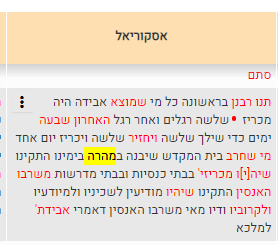Once the Temple was Destroyed ... May it be Speedily Rebuilt!
In last Wednesday’s daf yomi, Bava Metzia 28a, the maggid shiur (R’ Elchanan) quoted Rabbi Rosner’s daf yomi, at the 43 minute mark, for approximately one minute, about this:
תָּנוּ רַבָּנַן: בָּרִאשׁוֹנָה, כׇּל מִי שֶׁמָּצָא אֲבֵידָה הָיָה מַכְרִיז עָלֶיהָ שְׁלֹשָׁה רְגָלִים, וְאַחַר רֶגֶל אַחֲרוֹן שִׁבְעַת יָמִים, כְּדֵי שֶׁיֵּלֵךְ שְׁלֹשָׁה וְיַחְזוֹר שְׁלֹשָׁה וְיַכְרִיז יוֹם אֶחָד. מִשֶּׁחָרַב בֵּית הַמִּקְדָּשׁ, שֶׁיִּבָּנֶה בִּמְהֵרָה בְּיָמֵינוּ, הִתְקִינוּ שֶׁיְּהוּ מַכְרִיזִים בְּבָתֵּי כְנֵסִיּוֹת וּבְבָתֵּי מִדְרָשׁוֹת. וּמִשֶּׁרַבּוּ הָאַנָּסִים הִתְקִינוּ שֶׁיְּהוּ מוֹדִיעִין לִשְׁכֵינָיו וְלִמְיוּדָּעָיו וְדַיּוֹ.
§ The Sages taught: Initially, anyone who found a lost item would proclaim his find for three pilgrimage Festivals and for seven days after the last of the three pilgrimage Festivals, so that its owner will go to his home, a trip lasting up to three days, and will return to Jerusalem, a trip lasting up to three days, and proclaim his loss for one day. But from the time that the Temple was destroyed, may it be rebuilt speedily in our days, the Sages instituted that those who find lost items shall proclaim their finds in synagogues and study halls. And from the time that the oppressors proliferated, the Sages instituted an ordinance that one who finds a lost item shall inform his neighbors and acquaintances, and that will suffice for him.
While the gemara doesn’t always say שֶׁיִּבָּנֶה בִּמְהֵרָה בְּיָמֵינוּ, it often does. And he connects it to the imperative to hope for Mashiach’s arrival. And texts found in the Rambam. I’d also connect is to the idea we find in Rashi at the start of Noach, אֵ֚לֶּה תּֽוֹלְדֹ֣ת נֹ֔חַ נֹ֗חַ אִ֥ישׁ צַדִּ֛יק תָּמִ֥ים הָיָ֖ה בְּדֹֽרֹתָ֑יו אֶת־הָֽאֱלֹהִ֖ים הִתְהַלֶּךְ־נֹֽחַ. Rashi writes:
אֵלֶּה תּֽוֹלְדֹת נֹחַ נֹחַ אִישׁ צַדִּיק: הוֹאִיל וְהִזְכִּירוֹ סִפֵּר בְּשִׁבְחוֹ, שֶׁנֶּאֱמַר זֵכֶר צַדִּיק לִבְרָכָה (משלי י').
These are the generations of Noah—Noah was a righteous man: Since Scripture mentions him, it tells his praise, as it is said (Prov. 10:7): “The mention of a righteous man is for a blessing.” - [Pesikta Rabbathi 12].
Similarly, any time we mention churban habayit, it is a reflex to add שֶׁיִּבָּנֶה בִּמְהֵרָה בְּיָמֵינוּ. It doesn’t appear all the time, but a few times:
And this is the only one following “once the Temple was destroyed”. Compare with many cases where that phrase “once the Temple was destroyed” isn’t followed with hopes for its speedy rebuilding, such as:
Meanwhile, not all manuscripts of our sugya in Bava Metzia actually have this phrase. Thus, we find it in the Vilna and Venice printings:
as well as in the Escorial manuscript:
But all the other manuscripts on Hachi Garsinan, that is, Florence 8-9, Hamburg 165, Munich 95, Vatican 115a, and Vatican 117, all lack the phrase. One example, Vatican 115a:
does not include the phrase.
So, I don’t know that this can really stand as a Talmudic basis for a halacha requiring mentioning of the phrase. It seems more like the practice evolved over time, and then one scribe out of many, in one of the places in the sugyot it would be appropriate, reflexively included that phrasing in his own copy.







